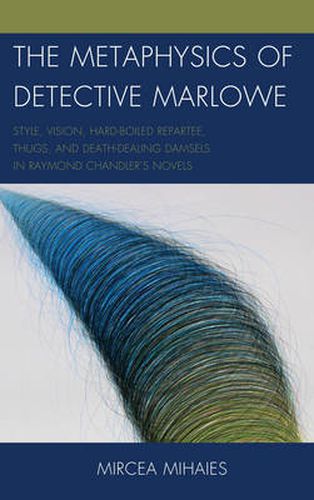Readings Newsletter
Become a Readings Member to make your shopping experience even easier.
Sign in or sign up for free!
You’re not far away from qualifying for FREE standard shipping within Australia
You’ve qualified for FREE standard shipping within Australia
The cart is loading…






This title is printed to order. This book may have been self-published. If so, we cannot guarantee the quality of the content. In the main most books will have gone through the editing process however some may not. We therefore suggest that you be aware of this before ordering this book. If in doubt check either the author or publisher’s details as we are unable to accept any returns unless they are faulty. Please contact us if you have any questions.
The Metaphysics of Detective Marlowe: Style, Vision, Hard-Boiled Repartee, Thugs, and Death-Dealing Damsels in Raymond Chandler’s Novels is a comparative study of ‘the life and times of an American idol, Raymond Chandler’s detective Philip Marlowe. It is a bitter-sweet critical exploration, meant to redefine the exceptional cultural profile, as well as the moral and social obsessions of one of America’s eminent fictional heroes. The study paints a colorful picture of the irresistible blend of romantic blind faith and social, moral and political toughness which characterized the United States in the 1930s-40s, with the memorable throng of drug dealers, hit men, vamps, corrupt politicians, and eccentric millionaires that colonize Raymond Chandler’s work. As the only defender of truth and honor in the Californian Waste Land, Philip Marlowe emerges as a symbolic figure, celebrated for the unique place he holds in the American hard-boiled mythology. The volume comprises an Introduction, Marlowe Before Marlowe, and four large chapters, each focusing on the innovations and enduring strategies behind Chandler’s persuasive vision: The Doughy Mass of Depravity, A Phantasm Called Style, The Villainy Septet and Marlowe After Marlowe.
As presented in this book, Philip Marlowe, 'the metaphysical sleuth,’ is a sentimentalist of the worst type: one embarrassed to show his true feelings. He is tough, but not tough enough and, consequently, a charming loser, always defeated in his confrontations with psychopath monsters and the legions of death-dealing damsels. The Californian detective’s gentleness and callousness are endearing: the gentleness is always callous, and the callousness is barely gentle. He seems to be the survivor of an extinct species, living for and by a code of honor. He believes in the purity of desires, expressed in a nascent idiom, a kind of secret/public language that heralds the resurrection of the new hard-boiled diction. His genuine candor is perfectly expressed in the directness of his talk, a brilliant example of rhetorical tightrope walking. Philip Marlowe embodies the contradictions of the problematic modernism-half bedlam, half expressionism-of his time and ours alike. The tradition he inaugurated is consistently illustrated today by James Ellroy, Allan Guthrie, Walter Mosley, Megan Abbott or Charlie Hudson.
$9.00 standard shipping within Australia
FREE standard shipping within Australia for orders over $100.00
Express & International shipping calculated at checkout
This title is printed to order. This book may have been self-published. If so, we cannot guarantee the quality of the content. In the main most books will have gone through the editing process however some may not. We therefore suggest that you be aware of this before ordering this book. If in doubt check either the author or publisher’s details as we are unable to accept any returns unless they are faulty. Please contact us if you have any questions.
The Metaphysics of Detective Marlowe: Style, Vision, Hard-Boiled Repartee, Thugs, and Death-Dealing Damsels in Raymond Chandler’s Novels is a comparative study of ‘the life and times of an American idol, Raymond Chandler’s detective Philip Marlowe. It is a bitter-sweet critical exploration, meant to redefine the exceptional cultural profile, as well as the moral and social obsessions of one of America’s eminent fictional heroes. The study paints a colorful picture of the irresistible blend of romantic blind faith and social, moral and political toughness which characterized the United States in the 1930s-40s, with the memorable throng of drug dealers, hit men, vamps, corrupt politicians, and eccentric millionaires that colonize Raymond Chandler’s work. As the only defender of truth and honor in the Californian Waste Land, Philip Marlowe emerges as a symbolic figure, celebrated for the unique place he holds in the American hard-boiled mythology. The volume comprises an Introduction, Marlowe Before Marlowe, and four large chapters, each focusing on the innovations and enduring strategies behind Chandler’s persuasive vision: The Doughy Mass of Depravity, A Phantasm Called Style, The Villainy Septet and Marlowe After Marlowe.
As presented in this book, Philip Marlowe, 'the metaphysical sleuth,’ is a sentimentalist of the worst type: one embarrassed to show his true feelings. He is tough, but not tough enough and, consequently, a charming loser, always defeated in his confrontations with psychopath monsters and the legions of death-dealing damsels. The Californian detective’s gentleness and callousness are endearing: the gentleness is always callous, and the callousness is barely gentle. He seems to be the survivor of an extinct species, living for and by a code of honor. He believes in the purity of desires, expressed in a nascent idiom, a kind of secret/public language that heralds the resurrection of the new hard-boiled diction. His genuine candor is perfectly expressed in the directness of his talk, a brilliant example of rhetorical tightrope walking. Philip Marlowe embodies the contradictions of the problematic modernism-half bedlam, half expressionism-of his time and ours alike. The tradition he inaugurated is consistently illustrated today by James Ellroy, Allan Guthrie, Walter Mosley, Megan Abbott or Charlie Hudson.